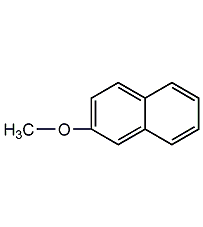2-Methoxynaphthalene 2-Methoxynaphthalene

Structural formula
| Business number | 025N |
|---|---|
| Molecular formula | C11H10O |
| Molecular weight | 158.2 |
| label |
B-naphthomethyl ether, β-naphthyl methyl ether, β-Methoxynaphthalene, β-naphthyl ether, 2-Naphthol methyl ether, Methyl-2-napthyl ether, artificial flavors, aromatic compounds |
Numbering system
CAS number:93-04-9
MDL number:MFCD00004061
EINECS number:202-213-6
RTECS number:QJ9468750
BRN number:1859408
PubChem number:24848894
Physical property data
1. Properties: Colorless flaky crystals
2. Density (g/mL, 25/4℃): 1.072
3. Relative vapor density (g/mL , air=1): Undetermined
4. Melting point (ºC): 73~74
5. Boiling point (ºC, normal pressure): 27
6. Boiling point (ºC, 5.2kPa): Not determined
7. Refractive index: Not determined
8. Flash point (ºC): Not determined
9. Specific rotation (º): Not determined
10. Autoignition point or ignition temperature (ºC): Not determined
11. Vapor pressure (kPa, 25ºC): Not determined Determined
12. Saturated vapor pressure (kPa, 60ºC): Undetermined
13. Heat of combustion (KJ/mol): Undetermined
14. Critical Temperature (ºC): Undetermined
15. Critical pressure (KPa): Undetermined
16. Log value of oil-water (octanol/water) partition coefficient: Undetermined
p>
17. Explosion upper limit (%, V/V): Undetermined
18. Explosion lower limit (%, V/V): Undetermined
19. Dissolution Properties: Insoluble in water, soluble in ether, benzene and chloroform, slightly soluble in carbon disulfide, slightly soluble in methanol and ethanol. Can evaporate with water vapor.
Toxicological data
Rat oral LD50: >5g/kg, rabbit skin test LD50: >5g/kg
Ecological data
Molecular structure data
1. Molar refractive index: 50.77
2. Molar volume (cm3/mol): 147.5
3. Isotonic specific volume (90.2K ): 367.7
4. Surface tension (dyne/cm): 38.5
5. Polarizability (10-24cm3):20.12
Compute chemical data
1. Hydrophobic parameter calculation reference value (XlogP): 3.5
2. Number of hydrogen bond donors: 0
3. Number of hydrogen bond acceptors: 1
4. Number of rotatable chemical bonds: 1
5. Number of tautomers:
6. Topological molecular polar surface area (TPSA): 9.2
7. Number of heavy atoms: 12
8. Surface charge: 0
9. Complexity: 144
10. Number of isotope atoms: 0
11. Determine the number of atomic stereocenters: 0
12. Uncertain number of atomic stereocenters: 0
13. Determine the number of chemical bond stereocenters Number: 0
14. Number of uncertain chemical bond stereocenters: 0
15. Number of covalent bond units: 1
Properties and stability
1. Found in burley tobacco leaves and oriental tobacco leaves.
Storage method
This product should be sealed and stored in a cool place. Packed in outer woven bag and inner plastic bag, 25kg per barrel.
Synthesis method
1. Obtained from the reaction of 2-naphthol and methanol. Heat 2-naphthol, methanol and sulfuric acid to reflux at 85-90°C for 6 hours, cool, filter, and wash until neutral. Distill under reduced pressure, collect the 168-180°C (2.67kPa) fraction, and recrystallize from methanol to obtain the finished product, with a yield of about 70%.
![]()
2. From 2-naphthol Obtained by reaction with dimethyl sulfate. Put water, sodium hydroxide solution and 2-naphthol into the reaction pot, add dimethyl sulfate at 10°C, and control the temperature of the material liquid not to exceed 36°C. Stir and react for 3 hours, then heat to 76-80°C for 1.5 hours. Cool to about 50°C, add ammonia water until the pH value is 11, cool, crystallize, and filter to obtain crude product. Recrystallize from ethanol to obtain 2-methoxynaphthalene fine product. 2-Methoxynaphthalene can also be purified by sublimation, while its similar product 2-ethoxynaphthalene (nerolin) does not sublime when heated and is generally refined by vacuum distillation.
![]()
3. Obtained from petroleum ether Flakes and fronds are obtained from ether.
Purpose
Used in daily fragrance formulations. Mainly used in soap box synthetic detergent fragrance formula, the dosage is within 10%.